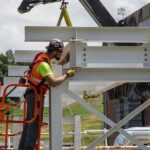
Oak Ridge National Laboratory and its Titan supercomputer are helping the U.S. Department of Energy fight cancer. (Photo courtesy of ORNL)
Oak Ridge National Laboratory and its Titan supercomputer are helping the U.S. Department of Energy fight cancer through a national initiative called Cancer Moonshot.
U.S. Energy Secretary Ernest Moniz wrote about the use of DOE supercomputers to fight cancer in an article posted on Medium.com on Friday.
“Cancer is a worldwide public health problem, and the second-leading cause of death in the United States,” Moniz said. “Although cancer mortality has declined in recent years, there is no one who hasn’t been touched by cancer personally. So when President Obama announced that Vice President Biden would lead the Cancer Moonshot during his State of the Union address and asked for all hands on deck, I was eager to join the Cancer Moonshot Task Force and lend the support of the Department of Energy and our 17 national laboratories.”
As part of the initiative, the U.S. Department of Energy is launching three pilot projects in partnership with the National Cancer Institute, ORNL spokesperson Morgan McCorkle said. The projects will bring together nearly 100 cancer researchers, care providers, computer scientists, and engineers to apply the nation’s most advanced supercomputing capabilities to analyze data from preclinical models in cancer, cancer surveillance data, and molecular interaction data for RAS genes, McCorkle said. (About one third of all human cancers, including a high percentage of pancreatic, lung, and colorectal cancers, are driven by mutations in RAS genes, according to the National Cancer Institute.)
McCorkle said four DOE national laboratories—Argonne, Los Alamos, Lawrence Livermore, and Oak Ridge, in conjunction with the NCI Frederick National Laboratory for Cancer Research—will participate in the pilot projects.
ORNL will contribute expertise in health care data analytics and computing assets, coordinated through its Health Data Sciences Institute, or HDSI, McCorkle said. Georgia Tourassi, HDSI director, and ORNL researchers will help lead the pilot pertaining to cancer surveillance, but will also be involved in the other pilot projects. The lab’s high-performance computing resources, including the Titan supercomputer, as well as leading experts in data sciences and neutron analysis, will support the effort, McCorkle said.
Moniz said supercomputers are key to the Cancer Moonshot.
“These exceptionally high-powered machines have the potential to greatly accelerate the development of cancer therapies by finding patterns in massive datasets too large for human analysis,” he said in the Medium post. “Supercomputers can help us better understand the complexity of cancer development, identify novel and effective treatments, and help elucidate patterns in vast and complex data sets that advance our understanding of cancer.”
He said the national labs are world-class research institutions that are used to tackling complex problems with a multidisciplinary approach — including climate change, clean energy, and the human genome—and they are also home to some of the fastest and most powerful supercomputers in the world.
The DOE commitment to the Cancer Moonshot builds on the department’s longstanding contributions to biomedical research, from radiation biology to genomics, Moniz said.

President Barack Obama, third from left, and Vice President Joe Biden, shown speaking, participate in a White House Cancer Moonshot Task Force meeting in the Vice President’s Ceremonial Office in the Eisenhower Executive Office Building of the White House, Feb. 1, 2016. Energy Secretary Ernest Moniz is to the right of Biden. (Official White House photo by Pete Souza)
Here is a website with more information about the DOE/NCI pilot projects:Â https://cbiit.nci.nih.gov/ncip/collaborative-design-of-advanced-computing-solutions-for-cancer.
See the article by Secretary Moniz, which includes a short video, here.
More information will be added as it becomes available.
Copyright 2016 Oak Ridge Today. All rights reserved. This material may not be published, broadcast, rewritten, or redistributed.








Leave a Reply